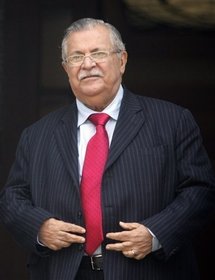
Jalal Talabani
The Kurdish groups together netted 57 seats in Iraq's 325-member parliament, which is tasked with electing the country's president.
No single party emerged with a majority in the house, leaving major blocs to negotiate with potential partners in a coalition government, a process expected to take several weeks, before a presidential vote.
Churach Haji, a representative for Goran ("change" in Kurdish), said the group backed Talabani's candidacy in principle but wanted an end to the alleged KDP-PUK persecution of his party over its drive for reforms.
Barzani's regional government last month lashed out at Iraqi Vice President Tareq al-Hashemi, a Sunni Arab, accusing him of stirring sectarian discord after he proposed that an Arab should be the next president.
Hashemi, one of two vice presidents along with a Shiite Arab, said after the election: "Iraq is an Arab country and it is legitimate that an Arab be appointed head of state."
Since the 2003 US-led ouster of Saddam Hussein that has largely sidelined the Sunni Arabs, Iraq's majority Shiites have dominated the political scene in coalition with the Kurds who also run their own region.
Talabani himself has said he wants to stay on in the largely ceremonial role which has been overshadowed by the prime minister's post in the post-Saddam era.
-------------------------------------------------------------------------
No single party emerged with a majority in the house, leaving major blocs to negotiate with potential partners in a coalition government, a process expected to take several weeks, before a presidential vote.
Churach Haji, a representative for Goran ("change" in Kurdish), said the group backed Talabani's candidacy in principle but wanted an end to the alleged KDP-PUK persecution of his party over its drive for reforms.
Barzani's regional government last month lashed out at Iraqi Vice President Tareq al-Hashemi, a Sunni Arab, accusing him of stirring sectarian discord after he proposed that an Arab should be the next president.
Hashemi, one of two vice presidents along with a Shiite Arab, said after the election: "Iraq is an Arab country and it is legitimate that an Arab be appointed head of state."
Since the 2003 US-led ouster of Saddam Hussein that has largely sidelined the Sunni Arabs, Iraq's majority Shiites have dominated the political scene in coalition with the Kurds who also run their own region.
Talabani himself has said he wants to stay on in the largely ceremonial role which has been overshadowed by the prime minister's post in the post-Saddam era.
-------------------------------------------------------------------------









 Home
Home Politics
Politics









